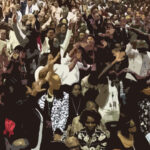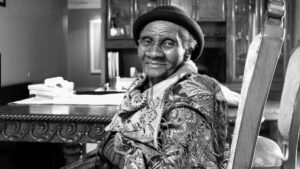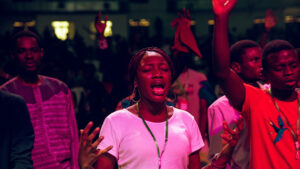Life in Africa is often lived in the tension of joy and sorrow. From the wails that echo through village funerals to the whispered prayers of a struggling parent, suffering is a reality we know all too well. Yet, despite this deep awareness of pain, many Christians struggle to process grief biblically. In some cases, cultural stoicism demands silent endurance, while triumphalism insists that sorrow has no place in a life of faith. Both extremes leave little room for honest lament.
I found myself wrestling with what it meant to mourn in a way that honoured God.
For me, the message of Dark Clouds, Deep Mercy came at a time when I was grappling with the weight of loss. Whether it was navigating my own suffering or even walking alongside someone who carried deep grief, I found myself wrestling with what it meant to mourn in a way that honoured God. Like many others, I had often associated faith with pressing forward, with “being strong” in the face of pain.
The Impact of Traditional Religions on How We Suffer
As I reflected on this, I began to notice something deeper at play in how we, as African Christians, respond to suffering. I realised that my own struggles with grief were not just personal but were shaped by a wider cultural and spiritual framework—one deeply influenced by African traditional religion (ATR). And it was rather interesting to see how Mark Vroegop addresses this gap with clarity and compassion in his book.
My struggles with grief were shaped by a wider cultural and spiritual framework.
Writing from his own grief after losing an unborn daughter, Vroegop invites us to rediscover lament—not as a sign of despair, but as a God-given way to process suffering and deepen our trust in him. He defines it as “an honest cry of a hurting heart wrestling with the paradox of pain and the promise of God’s goodness” (p26); a statement that is both profoundly biblical and deeply relatable. And for African Christians, it offers a much-needed corrective to how we often respond to suffering, which is often shaped more by African Traditional Religion (ATR) than by scripture.
As such, this article explores that contrast—between the worldview influenced by traditional African religions and the biblical model of lament that Dark Clouds, Deep Mercy so compellingly lays out.
ATR Insists on Identifying the Spiritual Source
For many African Christians, suffering is not seen as a normal part of life under God’s sovereign hand; but as something that must have a spiritual cause. In ATR thought, hardship is often traced back to malevolent spirits, ancestral curses, sorcery, or unseen enemies. As a result, when trials come, the instinct is to search for the source of misfortune rather than turning to God in lament. This worldview fosters a culture where, even while professing faith in Christ, many still turn to traditional spiritual practices: consulting diviners, using protective charms, or performing rituals to ward off affliction.
Our instinct is to search for the source of misfortune rather than turning to God in lament.
Vroegop’s book directly challenges this mindset. He writes, “Belief in God’s mercy, redemption, and sovereignty creates lament” (p26). Later he adds, “Laments are possible only if you believe that God is truly good” (p36). This strikes at the heart of the ATR-influenced tendency to see suffering primarily as spiritual warfare, rather than as something under God’s sovereign purposes. Biblical lament does not try to decode hidden causes of suffering but instead acknowledges the reality of a broken world while resting in the goodness of God.
God Invites Us to Lament
Vroegop outlines four steps in the journey of lament, drawing from Psalm 10; 13; 22; 77; and others. These are:
- Turn
- Complain
- Ask
- Trust.
Biblical lament begins by turning to God, not away from him. It invites us to bring our complaints before God. This isn’t in defiance. It’s in faith, acknowledging that he hears and cares.
Biblical lament begins by turning to God, not away from him.
Such honesty is often missing in African Christian practice. For the fear of offending God leads many to suffer in silence. Part of this struggle stems from how God is viewed by many traditional religions. In ATR, the Supreme Being is often seen as impossibly distant—too far removed to be concerned with the everyday struggles of human life. As a result, people turn to ancestral spirits or other intermediaries to bridge the gap between the divine and human experience.
This perspective can subtly shape how suffering is approached even among African Christians, making it difficult to see God as intimately involved in their pain. But through the Psalms, Vroegop helps us see that God invites our raw, unfiltered emotions. He is not distant. In fact, he is near.
Songs for Wounded People
In the second part of Dark Clouds, Deep Mercy, Vroegop turns to the book of Lamentations. He calls it “the most intense and comprehensive minor-key song in the scriptures.” This Old Testament book feels strikingly relevant in an African context, where suffering—whether from war, disease, or economic instability—is a shared, collective experience.
This small Old Testament book does more than grieve. It teaches.
Lamentations echoes the cries of those who have witnessed the devastation of their homes and lands. Yet Vroegop reminds us that this small Old Testament book does more than grieve. Lamentations teaches (2 Timothy 3:16; 1 Peter 1:12). It exposes the cost of sin and the emptiness of idols. Simultaneously, it presents the enduring hope found in God’s covenant faithfulness.
For African Christians, this is a crucial reminder, especially in a context where suffering is often attributed not only to human wrongdoing but also to offences against ancestors or spiritual forces.
We Mourn Sin and Hope for Heaven
However, one of the key lessons from Lamentations that Vroegop highlights is that sin, not merely the displeasure of spirits or unseen forces, is the true cause of suffering. He writes, “All lament and suffering have their roots in the fallen state of the world. Sorrow and pain owe their beginning to rebellion against God’s reign. Lament interprets all suffering through the lens of the Bible’s understanding of the problem of sin in the world.” Without sin, there would be no lament.
Lament is more than an outlet for grief. It reorients our hearts toward God.
Lament, then, is more than an outlet for grief. It reorients our hearts toward God. As Vroegop puts it, “Lament reminds us that the problem in the world is sin, and God is the only one who can make it right.” Whether we wrestle with the realities of corruption, poverty, or family dysfunction, lament dares us to hope while living in a broken world.
And if I may add, the gospel gives us this hope. For, in Christ, God hasn’t only diagnosed the problem. He has also provided the cure. Through Jesus’ life, death, and resurrection, Jesus bore the weight of our sins so that we might be reconciled to the Father. In him we find the ultimate answer to the brokenness that lament exposes. Rather than striving to restore harmony through human efforts, lament calls us to place our hope in the one who alone can make all things new.
Community, Our Churches and Lament
In the final section of Dark Clouds, Deep Mercy Vroegop shifts from teaching about lament to showing us how to live it out. He argues that “wherever there are tears, there should be biblical lament,” and offers practical ways to weave lament into both personal and communal worship.
Too often our worship is shaped by a need to project strength and victory.
This is a message African churches desperately need. Too often our worship is shaped by a need to project strength and victory. This leaves little room for those who are grieving. Thus Vroegop’s call to incorporate lament into our songs, sermons, and small groups reminds us that the church should be a refuge; a place where the brokenhearted find solidarity and healing.
Imagine a funeral where the grieving family is not just permitted to cry, but encouraged to cry out to God in faith. Picture a church service where songs of lament are sung alongside songs of praise, creating space for both mourning and rejoicing. This is the vision Vroegop casts for us: a community that laments together and, in doing so, draws nearer to God.
Neither Pain nor Suffering Are Forever
Pain, Vroegop reminds us, does not have to end in despair. His book is a much-needed call for African believers to embrace lament. However, lament is not a sign of weakness. It is a God-given pathway to hope. In a land where suffering is often unavoidable, Dark Clouds, Deep Mercy invites us to grieve with honesty, worship with trust, and rest in the assurance that sorrow will not have the final word.
Pain does not have to end in despair.
For pastors, counselors, and everyday believers walking through life’s hardships, this book is a treasure trove of wisdom. It reminds us that lament is not just a personal act but a communal gift, one that helps us process pain, deepen faith, and bear one another’s burdens.
In the end, Dark Clouds, Deep Mercy speaks directly to the African Christian experience. It calls us to reclaim the language of lament, not just as a means of enduring suffering, but as a way of drawing nearer to the God who walks with us through the darkest valleys and leads us into his marvellous light.














